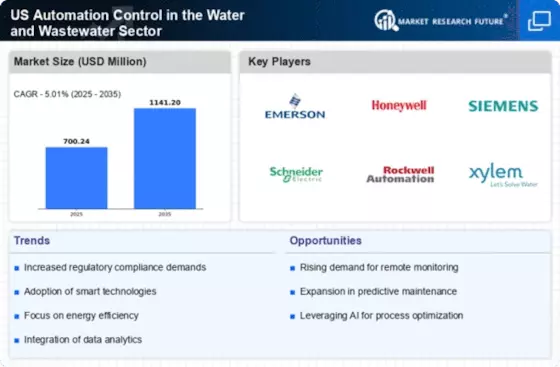Regulatory Compliance and Standards
The US Automation Control In The Water And Wastewater Industry is significantly influenced by stringent regulatory frameworks established by federal and state agencies. The Environmental Protection Agency (EPA) enforces regulations that mandate the treatment and quality of water, compelling utilities to adopt advanced automation technologies. Compliance with the Clean Water Act and Safe Drinking Water Act necessitates the implementation of automated systems for monitoring and reporting, which enhances operational efficiency. As of 2025, approximately 80% of water utilities in the US have integrated some form of automation to meet these regulatory requirements, indicating a robust market driver for automation solutions.
Aging Infrastructure and Investment Needs
The aging infrastructure of water and wastewater systems in the US presents a pressing challenge, driving the demand for automation control solutions. Many facilities are over 50 years old, leading to inefficiencies and increased maintenance costs. The American Society of Civil Engineers (ASCE) has estimated that the US requires over $1 trillion in investment to upgrade its water infrastructure by 2030. Automation technologies can optimize operations, reduce downtime, and extend the lifespan of existing assets. Consequently, the US Automation Control In The Water And Wastewater Industry is likely to see a surge in investments aimed at modernizing infrastructure through automation.
Technological Advancements and Innovation
The rapid pace of technological advancements is a key driver in the US Automation Control In The Water And Wastewater Industry. Innovations such as the Internet of Things (IoT), artificial intelligence (AI), and machine learning are transforming how water utilities operate. These technologies enable real-time data collection and analysis, leading to improved decision-making and operational efficiency. As of 2025, it is estimated that over 60% of water utilities in the US have begun to implement IoT-based solutions, indicating a strong trend towards automation. This shift not only enhances service delivery but also reduces operational costs.
Rising Water Scarcity and Demand Management
Water scarcity is becoming an increasingly critical issue in the US, particularly in arid regions. The growing population and industrial demands exacerbate the need for efficient water management. Automation control systems play a pivotal role in optimizing water distribution and usage, thereby addressing scarcity issues. For instance, smart irrigation systems and automated leak detection technologies can significantly reduce water waste. The US Automation Control In The Water And Wastewater Industry is thus experiencing heightened interest in solutions that enhance water conservation and management, with market growth projected to reach $5 billion by 2027.
Public Awareness and Environmental Stewardship
There is a growing public awareness regarding water quality and environmental sustainability in the US, which is influencing the Automation Control In The Water And Wastewater Industry. Citizens are increasingly demanding transparency and accountability from water utilities, prompting these organizations to adopt automated systems for better monitoring and reporting. This trend is further supported by initiatives aimed at promoting environmental stewardship, such as the EPA's WaterSense program. As a result, the US Automation Control In The Water And Wastewater Industry is likely to see increased investment in automation technologies that enhance water quality and promote sustainable practices.















